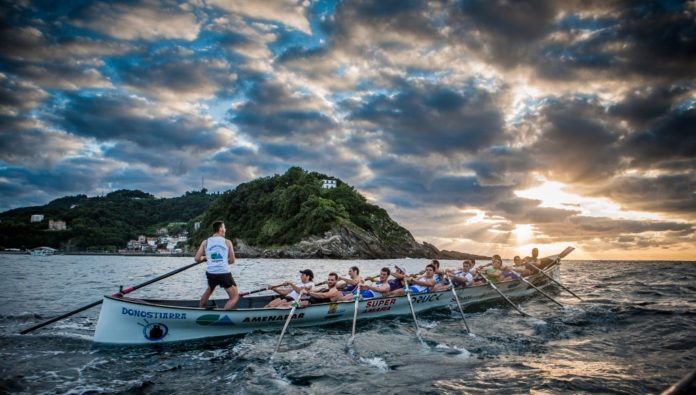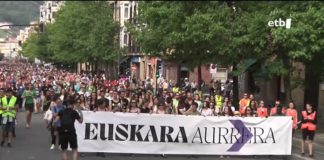In the last few weeks, a cultural incident made its way to the news that took us aback. Albeit not new and isolated, sparked uproar in Basque cultural circles. The young athletes of the rowing society Orioko Arraunketa Elkartea, entrenched in the town of Orio, receive guidelines and advice in Spanish during their training sessions. Orio happens to be one of the most densely Basque-speaking towns in our nation. Those close to the rowing milieu in Orio were aware at this point of the sad circumstances, this article is not the result of a current piece of news, but a telltale sign of a much wider and worrying reality that shakes Basque society in general and the most Basque-speaking areas in particular: the massive penetration of Spanish language and monolingual Spanish speakers in hitherto Basque-speaking environments.
Not many decades ago, our people made a firm commitment to the survival and future of our identity, laying out the necessary foundations for the new generations to keep the use and transmission of the Basque language and culture, both through the Basque language schools, the ikastolas, and other cultural associations. Sport is a cornerstone in the emotional development of young people, and one of the keys to maintaining loyalty to the language. Sport, moreover, holds a high symbolic value and is paramount for integration in the society surrounding the activity in question.
Just the opposite, the appointment of a coach who does not speak Basque truncates the integrative value of the Basque language in an overwhelmingly Basque speaking milieu so far. Unfortunately, this is not exclusive of Orio, the same goes for other rowing clubs in many other Basque-speaking towns. In these areas, Basque speakers are been alienated, Spanish acculturation has been encouraged, and the seeds of denationalisation have been sown shamelessly, something that young people are experiencing first-hand on a daily basis.
We are a people intent on living in our own language, a pursuit fraught with effort and hard work, enthusiasm and joy of many Basques committed to our language and its inclusive value. Accordingly, we wholeheartedly salute and embrace the message courageously addressed by the actress Itziar Ituño to the crowds in the same vein, at the start of Bilbao’s local summer festival. Let’s face it, there is nothing commendable, but very harmful, to have a person who spent part of his life rowing among Basque-speakers train and give explanations in Spanish to younger generations, since he does not know the language of the Basque Country.
No, the appointment of a Spanish-speaking coach in Orio or, for the matter, any other Basque-speaking town, does not hold any integration value. Instead, it encourages the atomization, disintegration of the Basque-speaking community and our people’s commitment to survival. Furthermore, a Basque-speaking coach or coxswain is still insufficient and highly disquieting if they direct the crew in Spanish under the pretext that there is a Spanish-speaking rower on the team; all you need is basic Basque to understand the coxswain’s guidelines. Rowing clubs should make it clear to the Spanish-speaking rowers the need of this minimum understanding. What sort of self-esteem and respect for its people does a rowing club show if it pushes the rowers to operate in Spanish instead of establishing this simple requirement on one or some Spanish-speakers?
We therefore call on local and associative agents to work for a truly inclusive decision on this issue that respects the own identity and features of the town. Additionally, we wish to express our full support to all community advocates of Basque culture and language in Orio who have seen their effort and expectations undermined.








